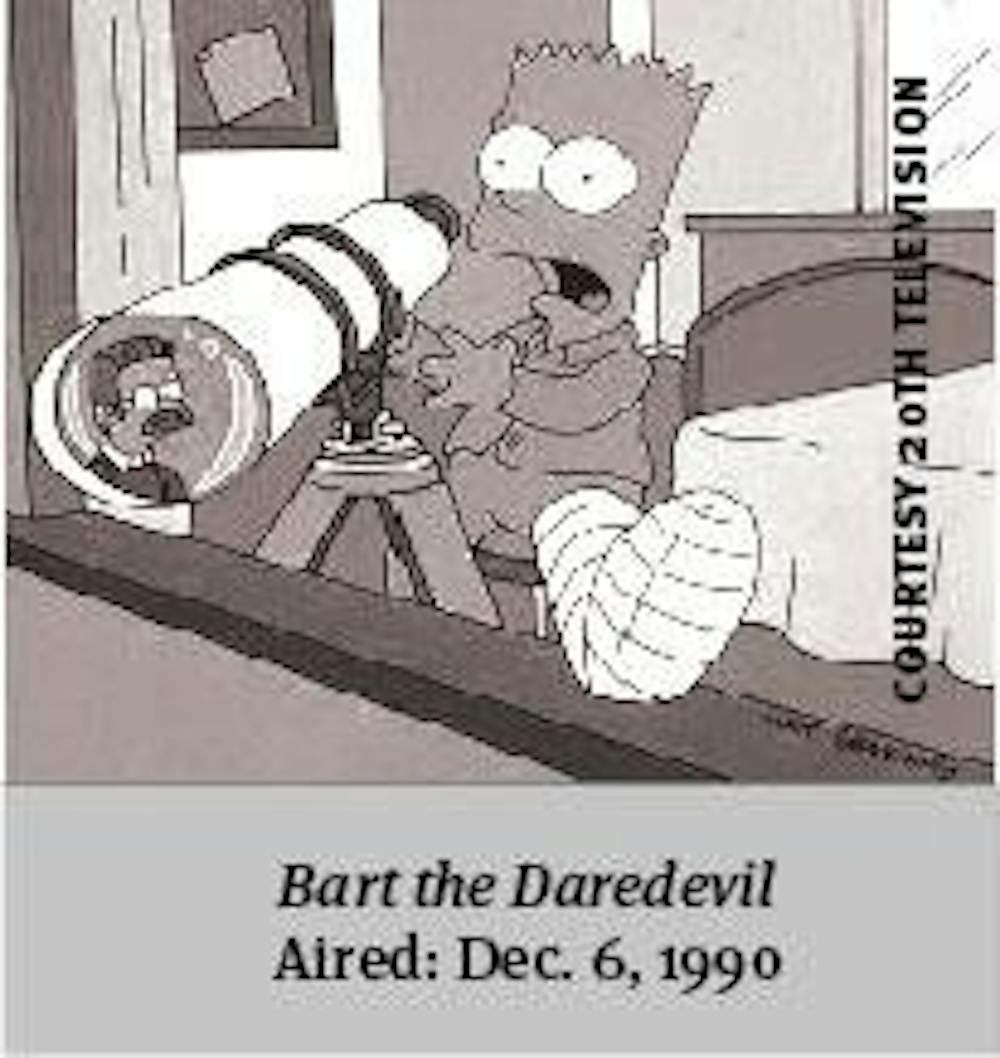Remembering 500 Episodes of 'The Simpsons'

This Sunday will mark a major milestone in American television history: "The Simpsons," the greatest TV program of all time, will air its 500th episode. What began in 1987 as a series of one-minute shorts on The Tracey Ullman Show has become a multibillion dollar franchise of clothing, action figures, board games, comic books, albums, video games, a feature film and a ride at Universal Studios. "D'oh!" is now an official English word. To commemorate the show's 20th anniversary, the U.S. Postal Service released a series of "The Simpsons" postage stamps. Its effect on American culture is unprecedented for a TV show and will not be matched for a long time, if ever.
When the shorts first aired, nobody could have expected them to develop into "The Simpsons" we know today. The shorts were clever – worth a smile and a few chuckles – but not hilarious. In 1989, Fox signed "The Simpsons" onto a contract for 13 episodes. The first season was a huge commercial and critical success. "The Simpsons" was the first Fox program to break into the top 30 in the Nielsen ratings of audience viewership, and the show earned its first of 27 Emmys in 1990.
In its first few years, "The Simpsons" was constantly the center of controversy. America had never seen a child on a TV program who openly disrespected authority, didn't obey his parents and got away with it. Bart Simpson embodied these traits and, worst of all, was a likable character. He was the bad boy we all wished we could be. The show received a lot of backlash from angry parents who viewed Bart as a bad role model. During George H.W. Bush's 1992 re-election campaign, he said in a speech that we needed families "a lot more like the Waltons and a lot less like ?the Simpsons."
However, the controversy only helped the program's ratings and kept bratty Bart on the air. While most shows would have stuck with Bart the rebel until all the ideas dried up, "The Simpsons" evolved. It introduced and developed characters outside the Simpson family. Moe's, Springfield Elementary and the Nuclear Power Plant became as familiar as the Simpsons' home. Secondary characters like Mr. Burns, Ned Flanders and Grampa became the main focus of episodes. By its 10th year, The Simpsons could air a superb 20-episode season focusing on a different character each episode. It added hundreds of auxiliary characters whose only purpose was to make us laugh, and they all worked.
"The Simpsons'" greatest change occurred in its central character. Bart the rebel was still prominent. In fact, he became more rebellious over the years, but the show started to focus more on Homer. He is an idiot and often an inconsiderate slob, but somehow we love him. He makes us laugh more than any character on the show, and he is so stupid that we can't blame him completely for his actions. When Homer tries to be a good person, whether he succeeds or not, he warms our hearts.
In recent years, more vulgar cartoons like "South Park" and "Family Guy" have challenged the popularity of "The Simpsons." Even the creators of these shows acknowledge how "The Simpsons" pioneered the adult cartoon genre. South Park creators Matt Stone and Trey Parker admit that they would probably be unemployed without "The Simpsons." They even made an episode called "The Simpsons Already Did It" in which the character Butters is frustrated because all of his ideas have already appeared on ?"The Simpsons."
Ultimately, "Simpsons" fans will remember the show for its overt physical humor, deceptive wit and emotional power. Watching Homer fall down Springfield Gorge was the hardest I have ever laughed in my life. The episode "Life on the Fast Lane" – in which Marge is seconds away from cheating on Homer before she has a change of heart – is one of the most emotional episodes of any TV show. When I visited my ex-neighbor for the first time in five years, we overcame the initial awkwardness by bonding over our childhood love of "The Simpsons." Undoubtedly, the show has been declining steadily over the last 10 years, but when I tune in this Sunday, I won't be thinking about that.
More from The Rice Thresher

Over 1,000 students petition against new meal plan
When Konstantin Savvon opened the Housing and Dining email announcing the new unlimited meal plan, he was instantly concerned about the impact on off-campus students like himself.

Rice football wins season opener under new coach
For the first time since 2018, Rice football opened its season with a victory. Scott Abell was soaked with yellow Powerade following a 14-12 win on the road Saturday against the University of Louisiana at Lafayette, which won 10 games and made it to the Sun Belt Conference championship last season.

Acting like an athlete: Rice basketball alum takes on Broadway
Underneath Chadd Alexander’s Broadway costume, there’s ankle tape and wrist braces — same protective gear he wore as a walk-on basketball player at Rice, though now he’s performing eight shows a week in the ensemble of “Harry Potter and the Cursed Child” instead of running conditioning drills in Tudor Fieldhouse.

Please note All comments are eligible for publication by The Rice Thresher.